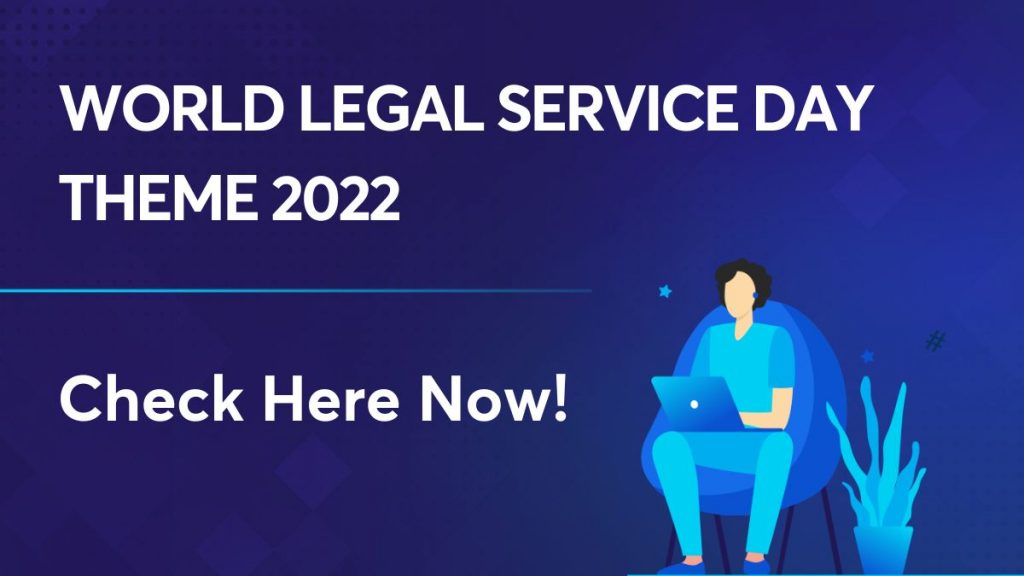Last updated on February 16th, 2023 at 01:02 am
National legal service day theme 2022: The Legal Services Day (राष्ट्रीय विधिक सेवा दिवस), which will be observed on November 9, 2022, will raise awareness of the activities associated with legal services in India. In order to live a life free from discrimination in India without having to worry about the law or any form of racism, citizens will be able to learn more about their constitutions and become aware of the legal services that are available to them.
National legal service day theme 2022
The legal services day is one of those days when people are given every type of basic facility related to Food, Water, Shelter, Medicines, Clothes, and Education. Every citizen of India is given rights and opportunities, and every person is given access to basic amenities so they can live there without worrying about being treated unfairly.
The Theme for National Legal Services Day in 2022 hasn’t been revealed yet. Soon, the National Legal Services Theme 2022 will be disclosed. The day’s celebrations are focused on educating people about their rights and the opportunities offered by the Indian government so they can access social benefits and live lives free from poverty. Higher legal services authorities hold meetings to commemorate Legal Services Day. In order to give country’s people the most benefits and support them in leading happy lives, the authorities address the most recent legal services laws and orders.
Concept of National legal service day (NLSD)
- In an effort to aid the underprivileged and weaker segments of society, the Supreme Court of India established National Legal Services Day (NLSD) in 1995.
- The provision of free legal assistance is available in cases before Civil, Criminal, and Revenue Courts, Tribunals, or any other authority performing judicial or quasi-judicial activities.
- Facilities are made available to assist the underprivileged, aged, and disadvantaged people with the legal processes and if they require it, it also informs them about the numerous legal procedure information.
- Women and children, people with disabilities, members of scheduled castes or scheduled tribes, industrial workers, people in custody, victims of natural disasters, violence against ethnic or caste groups, victims of industrial disaster, victims of human trafficking, beggars and individuals whose yearly income is less than Rs. 1,00,000 or as otherwise designated by the Central or State Governments are all qualified to receive free legal advice.
Check other important days below –
| World Tsunami Awareness Day Theme 2022 | National Cancer Awareness Day Theme 2022 | National Unity Day speech |
| National Legal Service Day | International Translation Day | National Cancer Awareness Day |
History of National legal service day
The national legal services day was instituted by the Indian Supreme Court in 1995, but it was first established on October 11, 1987, with the goal of providing economically disadvantaged members of society with the necessary legal services support and raising their awareness of the legal services available in India so they can live their lives free from discrimination. Since the financially deprived group in society is frequently the target of racism and discrimination, Legal Services Day is crucial for them.
The Legal Services Authorities Act, 1987 established the National Legal Services Authority (NALSA) to offer legal services.
Significance of National legal service day
The National Legal Service Day’s goal is to give qualified, no-cost legal assistance to persons who are members of the nation’s socioeconomically disadvantaged communities. In order to establish a “statutory base to legal aid schemes” in India according to a set structure, the Legal Services Authorities Act was passed in 1987. The Act also mentions the establishment of Lok Adalats for the adjudication of disputes equitably.
The candidates from the backward categories are also given a variety of facilities so that they can obtain accurate information about the legal services that are available to them in the country and so that they are aware of the various details related to the legal procedures. In India, services are provided to help elderly persons and poor students with the legal processes.
Institutions providing free legal services on National Legal Service day
- NATIONAL LEVEL
- National Legal Services Authority (NALSA)- In accordance with the Legal Services Authorities Act of 1987, NALSA was established to offer free legal assistance to the less fortunate members of society. It was established to exercise the authority and carry out the duties given to the central authority by the legislation.
- Supreme Court Legal Services Committee (SCLSC)- Supreme Court Legal Services Committee (SCLSC) was established to offer services at Supreme Court level
- Central authority- The chief of justice in India comprises of the central authority, and they are prepared to provide the less fortunate members of society free legal assistance.
- STATE LEVEL
- State Legal Services Authorities (SLSAs)- Thirty seven- State Legal Services Authorities (SLSAs) are responsible for providing free legal services at State level
- High Court Legal Services Committees (HCLSCs)- Thirty nine- High Court Legal Services Committees (HCLSCs) give accurate information about the legal services at High Court level
- DISTRICT LEVEL
- District Legal Services Authorities (DLSAs)- six seventy three- District Legal Services Authorities (DLSAs) to support poor and underprivileged sections of the society at District level
- Taluk Legal Services Committees (TLSCs)- two thousand four hundred sixty five- Taluk Legal Services Committees (TLSCs) at Taluk level
National Legal Service Day Theme 2022 FAQs
National legal service day is a day which highlights the need for spreading awareness and ensuring fair & justice procedure for all citizens
Every year,The National Legal Services Day is observed on November 9
National Legal Services Day theme 2022 hasn’t been revealed yet
The National Legal Service Day’s goal is to give qualified, no-cost legal assistance to persons who are members of the nation’s socioeconomically disadvantaged communities
‘The laws must be just so they may be followed without anyone possibly objecting to these rules’.
